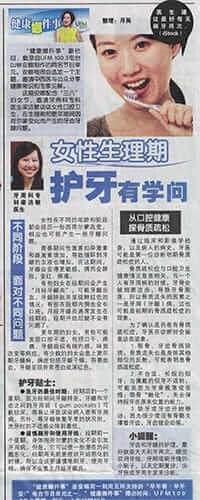This article first appeared in Lianhe Wanbao (联合晚报) on 13 March 2016. For the benefit of those who missed the article, or who cannot access the publication in Chinese, we have summarized the content of the article below.
“Anna Health” is a column in Lianhe Wanbao that is reproduced from the similarly named radio programme “健康娜件事” on UFM 100.3 (Singapore radio station) hosted by DJ Anna. Every week, Anna would invite a doctor to share health knowledge and insights with her listeners.
This week’s theme, in conjunction with International Women’s Day, is how hormonal changes during menstrual cycles, pregnancy and menopause affect women’s gum health. Dr Daylene Leong, Dental Specialist in Periodontics of Specialist Dental Group, shared the below during Anna’s show.
Facing different issues during different life stages
Hormonal fluctuations are something that affect women differently at each age and stage of life; bringing along different gum problems.
1) Puberty
During puberty, there is an increase in the production of estrogen and progesterone (female hormones), which causes an increase in blood flowing to the gums. This results in the gums becoming more sensitive (bleeding easily during brushing and flossing), and occasionally red, tender and swollen.
2) Menstruation
During the monthly menstrual cycle (period), some women may experience menstruation gingivitis – a condition where their gums bleed easily, appear red, tender and swollen. Other oral issues experienced may include ulcers on the inside of cheeks. These symptoms generally occur one to two days before the start of the period and go away soon after it starts.
3) Menopause
During menopause, some women may experience symptoms such as dry mouth, pain, burning sensation in the gums and altered sense of taste. A small proportion of women may suffer from menopausal gingivostomatitis – a condition where their gums appear dry or shiny, bleed easily and look peculiarly pale or deep red.
Detecting osteoporosis based on the health of your mouth
Another common issue among woman is osteoporosis as women are more likely to get osteoporosis than men. According to a study, an Asian female aged 50 years and above will be at an even higher risk of having osteoporosis.
Through a clinical examination of your mouth and dental x-ray, your dentist could be the first to detect if you have early stages of osteoporosis.
There is a link between osteoporosis and oral health. When one has severe gum disease, the body’s immune system attempts to fight against the bacteria found in the plaque that has accumulated below the gum line. While this happens, together with bacterial toxins, the supporting bones are being attacked too. This results in bone loss and eventually, the teeth may become loose and have to be removed.
As severe gum disease causes bone loss, it is also one of the indicators for the early stages of osteoporosis.
Here are some signs that the dentist would look out for:
- Bone loss in the jaw and around the teeth are early indicators of bone loss in other parts of the body
- Loose or ill-fitting dentures can be a result of severe bone loss, causing the dentures to no longer fit snugly
- Missing or loose teeth happens when there are less bone to support the teeth
Gentle reminders
- The best time to visit the dentist for a routine clean is one week after one’s period. As the gum swells during the monthly menstrual cycle, the gum pockets may be deeper and may be misdiagnosed as gum disease. In addition, when the gums have revert to its original condition, it would be less sensitive hence less discomfort would be felt during the cleaning.
- Brush and floss diligently. As the symptoms would generally worsen two days before one’s period, it is advised that oral hygiene is well taken care of to prevent menstruation gingivitis.
- In addition to flossing before you sleep, keep to the rule of 2-2-2: brush your teeth 2 times a day, for 2 minutes each and visit your dentist 2 times a year.
Anna Health is a radio programme hosted by DJ Anna. To listen, tune into UFM100.3 every Monday to Friday at 10.40am.






